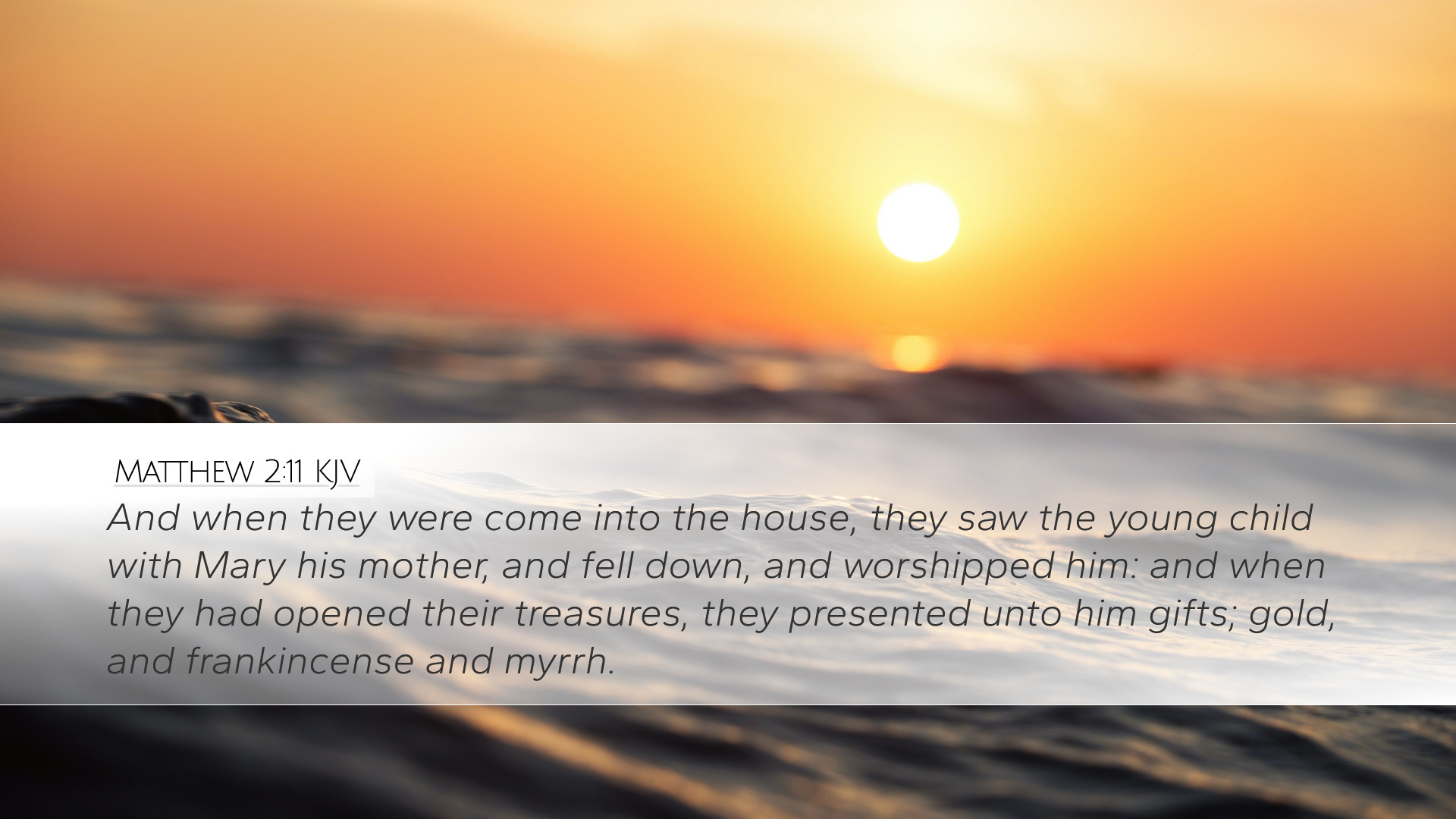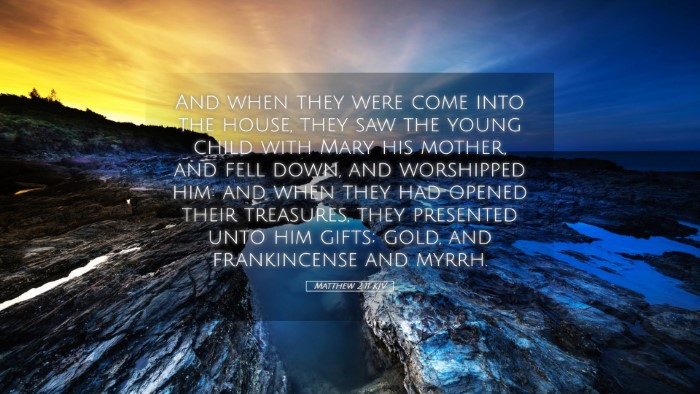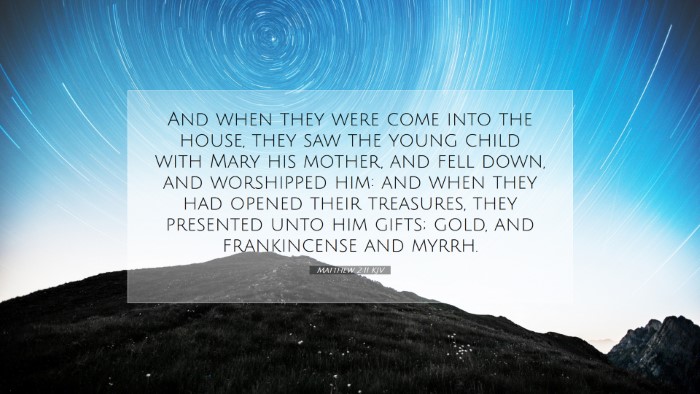Matthew 2:11 Commentary
Bible Verse: "And when they were come into the house, they saw the young child with Mary his mother, and fell down, and worshipped him: and when they had opened their treasures, they presented unto him gifts; gold, and frankincense, and myrrh."
Introduction
Matthew 2:11 depicts a pivotal moment in the narrative of the Magi, who travel from afar to seek the newly born King, Jesus. This passage holds significant theological implications, providing insights into the recognition of Christ's kingship, the nature of worship, and the symbolism of the gifts presented. Various public domain commentaries offer rich perspectives on this Bible verse, which can enhance our understanding of its profound meaning.
Contextual Analysis
Before delving into the specifics of verse 11, it is essential to consider the context of the surrounding verses. The Magi's journey is introduced in Matthew 2:1-10, where they follow a star that signifies the birth of Jesus. Their journey represents not only a physical search but a spiritual quest for truth.
Matthew Henry notes that the Magi, likely Persian astrologers, were guided by divine providence. They exhibited a genuine thirst for knowledge and truth, seeking to worship the one who would fulfill the prophecies. This highlights the theme of God revealing Himself to those who earnestly pursue Him.
The Arrival and Recognition
Verse 11 begins with the phrase, "when they were come into the house." This indicates a shift from their initial journey, aligning their actions with the fulfillment of their purpose. Albert Barnes emphasizes that this journey culminates in encountering Jesus, which represents a divine fulfillment of purpose for both the seekers and the sought.
Upon entering the house, they "saw the young child with Mary his mother." Adam Clarke states that this emphasizes the ordinary circumstances under which the extraordinary Savior was revealed. The presence of Mary underscores the humble beginnings of Christ's life and the nurturing role of His mother in His upbringing, highlighting the dual nature of His identity as both God and man.
Worshipping the Child
The act of the Magi falling down and worshipping Jesus is a profound statement of reverence. Matthew Henry argues that their worship demonstrates recognition of His sovereignty and divinity. The verb "worshipped" indicates not only adoration but also submission to His authority as King.
This act of worship can be dissected further into several components:
- Gesture of Humility: The Magi, learned men of high status, humbled themselves before a child, modeling an essential attitude of humility in true worship.
- Intent of Worship: The Magi did not come to merely pay homage; they intended to respond to the revelation of Christ’s kingship.
- Recognition of Identity: Their acknowledgment of Jesus' divine nature was foreshadowed in the prophecies concerning the Messiah.
The Presentation of Gifts
Subsequently, the Magi presented their gifts of gold, frankincense, and myrrh. Each gift carries deep symbolic meaning:
- Gold: Represents Jesus’ kingship, acknowledging Him as the King of Kings. Albert Barnes highlights that gold was appropriate service to a king, recognizing Christ’s sovereign rule.
- Frankincense: This precious aromatic resin symbolizes deity and worship. Adam Clarke elucidates that it was used in worship rituals and signifies Christ’s divine nature, as He is worthy of our worship.
- Myrrh: Typically associated with burial, myrrh foreshadows Christ's suffering and sacrifice. This gift prophetically symbolizes His future passion, as noted by Matthew Henry.
Theological Implications
Matthew 2:11 encapsulates several theological themes relevant to evangelicals and scholars alike:
- The Universality of Salvation: The Magi represent the Gentiles seeking the Jewish Messiah, indicating that salvation through Christ transcends ethnic and cultural boundaries.
- Recognition of Christ's Authority: Their journey underscores the acknowledgment of Jesus as the rightful King, which challenges political and religious authorities of the day.
- The Nature of Worship: It calls the faithful to examine the depth of their own worship—Are we truly submitting to Christ as our King? Are we bringing our best to Him?
Conclusion
Matthew 2:11 serves as an essential reminder of the reverence and recognition due to Christ. It exhorts believers to examine their worship and the motives behind their offerings. By studying the insights of esteemed commentators like Matthew Henry, Albert Barnes, and Adam Clarke, we gain a deeper appreciation for this passage and its significance in our lives and ministries.
As we reflect on this scripture, may we, like the Magi, seek Christ wholeheartedly, worship Him sincerely, and offer the best of our treasures in service to Him.


